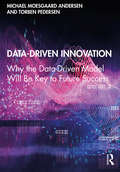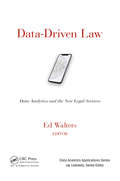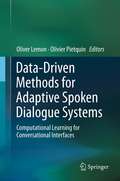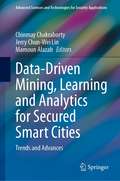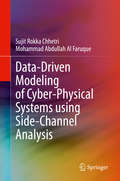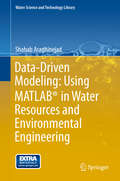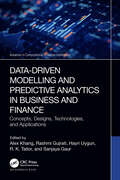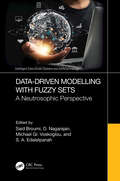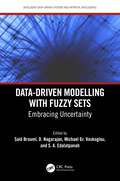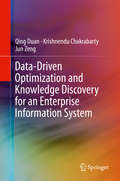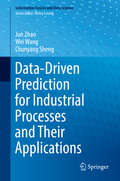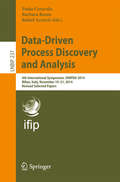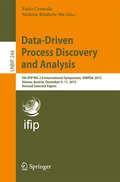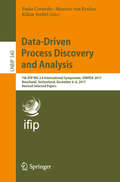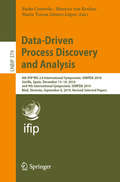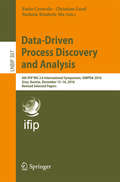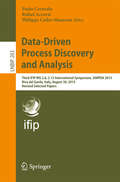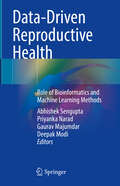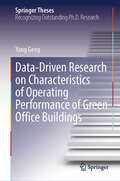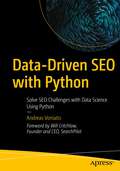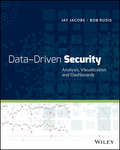- Table View
- List View
Data-Driven Innovation: Why the Data-Driven Model Will Be Key to Future Success
by Torben Pedersen Michael Moesgaard AndersenToday, innovation does not just occur in large and incumbent R&D organizations. Instead, it often emerges from the start-up community. In the new innovation economy, the key is to quickly find pieces of innovation, some of which may already be developed. Therefore, there is the need for more advanced means of searching and identifying innovation wherever it may occurs. We point to the importance of data-driven innovation based on digital platforms, as their footprints are growing rapidly and in sync with the shift from analogue to digital innovation workflows. This book offers companies insights on paths to business success and tools that will help them find the right route through the various options when it comes to the digital platforms where innovations may be discovered and from which value may be appropriated. The world hungers for growth and one of the most important vehicles for growth is innovation. In light of the new digital platforms from which data-driven innovation can be extracted, major parts of analogue workflows will be substituted with digital workflows. Data-driven innovation and digital innovation workflows are here to stay. Are you?
Data-Driven Intelligence in Wireless Networks: Concepts, Solutions, and Applications
by Sung Won Kim Muhammad Khalil Afzal Muhammad AteeqThis book highlights the importance of data-driven techniques to solve wireless communication problems. It presents a number of problems (e.g., related to performance, security, and social networking), and provides solutions using various data-driven techniques, including machine learning, deep learning, federated learning, and artificial intelligence.This book details wireless communication problems that can be solved by data-driven solutions. It presents a generalized approach toward solving problems using specific data-driven techniques. The book also develops a taxonomy of problems according to the type of solution presented and includes several case studies that examine data-driven solutions for issues such as quality of service (QoS) in heterogeneous wireless networks, 5G/6G networks, and security in wireless networks. The target audience of this book includes professionals, researchers, professors, and students working in the field of networking, communications, machine learning, and related fields.
Data-Driven Law: Data Analytics and the New Legal Services (Data Analytics Applications)
by Edward J. WaltersFor increasingly data-savvy clients, lawyers can no longer give "it depends" answers rooted in anecdata. Clients insist that their lawyers justify their reasoning, and with more than a limited set of war stories. The considered judgment of an experienced lawyer is unquestionably valuable. However, on balance, clients would rather have the considered judgment of an experienced lawyer informed by the most relevant information required to answer their questions. Data-Driven Law: Data Analytics and the New Legal Services helps legal professionals meet the challenges posed by a data-driven approach to delivering legal services. Its chapters are written by leading experts who cover such topics as: Mining legal data Computational law Uncovering bias through the use of Big Data Quantifying the quality of legal services Data mining and decision-making Contract analytics and contract standards In addition to providing clients with data-based insight, legal firms can track a matter with data from beginning to end, from the marketing spend through to the type of matter, hours spent, billed, and collected, including metrics on profitability and success. Firms can organize and collect documents after a matter and even automate them for reuse. Data on marketing related to a matter can be an amazing source of insight about which practice areas are most profitable. Data-driven decision-making requires firms to think differently about their workflow. Most firms warehouse their files, never to be seen again after the matter closes. Running a data-driven firm requires lawyers and their teams to treat information about the work as part of the service, and to collect, standardize, and analyze matter data from cradle to grave. More than anything, using data in a law practice requires a different mindset about the value of this information. This book helps legal professionals to develop this data-driven mindset.
Data-Driven Methods for Adaptive Spoken Dialogue Systems: Computational Learning for Conversational Interfaces
by Oliver Lemon Olivier PietquinData driven methods have long been used in Automatic Speech Recognition (ASR) and Text-To-Speech (TTS) synthesis and have more recently been introduced for dialogue management, spoken language understanding, and Natural Language Generation. Machine learning is now present "end-to-end" in Spoken Dialogue Systems (SDS). However, these techniques require data collection and annotation campaigns, which can be time-consuming and expensive, as well as dataset expansion by simulation. In this book, we provide an overview of the current state of the field and of recent advances, with a specific focus on adaptivity.
Data-Driven Mining, Learning and Analytics for Secured Smart Cities: Trends and Advances (Advanced Sciences and Technologies for Security Applications)
by Jerry Chun-Wei Lin Mamoun Alazab Chinmay ChakrabortyThis book provides information on data-driven infrastructure design, analytical approaches, and technological solutions with case studies for smart cities. This book aims to attract works on multidisciplinary research spanning across the computer science and engineering, environmental studies, services, urban planning and development, social sciences and industrial engineering on technologies, case studies, novel approaches, and visionary ideas related to data-driven innovative solutions and big data-powered applications to cope with the real world challenges for building smart cities.
Data-Driven Modeling of Cyber-Physical Systems using Side-Channel Analysis
by Mohammad Abdullah Al Faruque Sujit Rokka ChhetriThis book provides a new perspective on modeling cyber-physical systems (CPS), using a data-driven approach. The authors cover the use of state-of-the-art machine learning and artificial intelligence algorithms for modeling various aspect of the CPS. This book provides insight on how a data-driven modeling approach can be utilized to take advantage of the relation between the cyber and the physical domain of the CPS to aid the first-principle approach in capturing the stochastic phenomena affecting the CPS. The authors provide practical use cases of the data-driven modeling approach for securing the CPS, presenting novel attack models, building and maintaining the digital twin of the physical system. The book also presents novel, data-driven algorithms to handle non- Euclidean data. In summary, this book presents a novel perspective for modeling the CPS.
Data-Driven Modeling: Using MATLAB® in Water Resources and Environmental Engineering (Water Science and Technology Library #67)
by Shahab Araghinejad"Data-Driven Modeling: Using MATLAB® in Water Resources and Environmental Engineering" provides a systematic account of major concepts and methodologies for data-driven models and presents a unified framework that makes the subject more accessible to and applicable for researchers and practitioners. It integrates important theories and applications of data-driven models and uses them to deal with a wide range of problems in the field of water resources and environmental engineering such as hydrological forecasting, flood analysis, water quality monitoring, regionalizing climatic data, and general function approximation. The book presents the statistical-based models including basic statistical analysis, nonparametric and logistic regression methods, time series analysis and modeling, and support vector machines. It also deals with the analysis and modeling based on artificial intelligence techniques including static and dynamic neural networks, statistical neural networks, fuzzy inference systems, and fuzzy regression. The book also discusses hybrid models as well as multi-model data fusion to wrap up the covered models and techniques. The source files of relatively simple and advanced programs demonstrating how to use the models are presented together with practical advice on how to best apply them. The programs, which have been developed using the MATLAB® unified platform, can be found on extras. springer. com. The main audience of this book includes graduate students in water resources engineering, environmental engineering, agricultural engineering, and natural resources engineering. This book may be adapted for use as a senior undergraduate and graduate textbook by focusing on selected topics. Alternatively, it may also be used as a valuable resource book for practicing engineers, consulting engineers, scientists and others involved in water resources and environmental engineering.
Data-Driven Modelling and Predictive Analytics in Business and Finance: Concepts, Designs, Technologies, and Applications (Advances in Computational Collective Intelligence)
by Alex Khang Rashmi Gujrati Hayri Uygun R. K. Tailor Sanjaya Singh GaurData-driven and AI-aided applications are next-generation technologies that can be used to visualize and realize intelligent transactions in finance, banking, and business. These transactions will be enabled by powerful data-driven solutions, IoT technologies, AI-aided techniques, data analytics, and visualization tools. To implement these solutions, frameworks will be needed to support human control of intelligent computing and modern business systems. The power and consistency of data-driven competencies are a critical challenge, and so is developing explainable AI (XAI) to make data-driven transactions transparent.Data- Driven Modelling and Predictive Analytics in Business and Finance covers the need for intelligent business solutions and applications. Explaining how business applications use algorithms and models to bring out the desired results, the book covers: Data-driven modelling Predictive analytics Data analytics and visualization tools AI-aided applications Cybersecurity techniques Cloud computing IoT-enabled systems for developing smart financial systems This book was written for business analysts, financial analysts, scholars, researchers, academics, professionals, and students so they may be able to share and contribute new ideas, methodologies, technologies, approaches, models, frameworks, theories, and practices.
Data-Driven Modelling with Fuzzy Sets: A Neutrosophic Perspective (Intelligent Data-Driven Systems and Artificial Intelligence)
by Said Broumi D. Nagarajan Michael Gr. Voskoglou S. A. EdalatpanahFuzzy sets have long been employed to handle imprecise and uncertain information in the real world, but their limitations in dealing with incomplete and inconsistent data led to the emergence of neutrosophic sets. In this thought-provoking book, titled Data-Driven Modelling with Fuzzy Sets: A Neutrosophic Perspective, the authors delve into the theories and extensive applications of neutrosophic sets, ranging from neutrosophic graphs to single-valued trapezoidal neutrosophic sets and their practical implications in knowledge management, including student learning assessment, academic performance evaluation, and technical article screening. This comprehensive resource is intended to benefit mathematicians, physicists, computer experts, engineers, scholars, practitioners, and students seeking to deepen their understanding of neutrosophic sets and their practical applications in diverse fields. This book comprises 11 chapters that provide a thorough examination of neutrosophic set theory and its extensions. Each chapter presents valuable insights into various aspects of data-driven modeling with neutrosophic sets and explores their applications in different domains. The book covers a wide range of topics. The specific topics covered in the book include neutrosophic submodules, applications of neutrosophic sets, solutions to differential equations with neutrosophic uncertainty, cardinalities of neutrosophic sets, neutrosophic cylindrical coordinates, applications to graphs and climatic analysis, neutrosophic differential equation approaches to growth models, neutrosophic aggregation operators for decision making, and similarity measures for Fermatean neutrosophic sets. The diverse contributions from experts in the field, coupled with the constructive feedback from reviewers, ensure the book's high quality and relevance.This book presents a qualitative assessment of big data in the education sector using linguistic quadripartitioned single-valued neutrosophic soft sets showcases application of n-cylindrical fuzzy neutrosophic sets in education using neutrosophic affinity degree and neutrosophic similarity index covers scientific evaluation of student academic performance using single-valued neutrosophic Markov chain illustrates multi-granulation single-valued neutrosophic probabilistic rough sets for teamwork assessment examines estimation of distribution algorithms based on multiple-attribute group decision-making to evaluate teaching quality With its wealth of knowledge, this book aims to inspire further research and innovation in the field of neutrosophic sets and their extensions, providing a valuable resource for scholars, practitioners, and students alike.
Data-Driven Modelling with Fuzzy Sets: Embracing Uncertainty (Intelligent Data-Driven Systems and Artificial Intelligence)
by Said Broumi D. Nagarajan Michael Gr. Voskoglou S. A. EdalatpanahZadeh introduced in 1965 the theory of fuzzy sets, in which truth values are modelled by numbers in the unit interval [0, 1], for tackling mathematically the frequently appearing in everyday life partial truths. In a second stage, when membership functions were reinterpreted as possibility distributions, fuzzy sets were extensively used to embrace uncertainty modelling. Uncertainty is defined as the shortage of precise knowledge or complete information and possibility theory is devoted to the handling of incomplete information. Zadeh articulated the relationship between possibility and probability, noticing that what is probable must preliminarily be possible. Following the Zadeh’s fuzzy set, various generalizations (intuitionistic, neutrosophic, rough, soft sets, etc.) have been introduced enabling a more effective management of all types of the existing in real world uncertainty. This book presents recent theoretical advances and applications of fuzzy sets and their extensions to Science, Humanities and Education.This book: Presents a qualitative assessment of big data in the education sector using linguistic Quadri partitioned single valued neutrosophic soft sets. Showcases application of n-cylindrical fuzzy neutrosophic sets in education using neutrosophic affinity degree and neutrosophic similarity Index. Covers scientific evaluation of student academic performance using single value neutrosophic Markov chain. Illustrates multi-granulation single-valued neutrosophic probabilistic rough sets for teamwork assessment. Examines estimation of distribution algorithm based on multiple attribute group decision-making to evaluate teaching quality. It is primarily written for Senior undergraduate and graduate students and academic researchers in the fields of electrical engineering, electronics and communication engineering, computer science and engineering.
Data-Driven Optimization and Knowledge Discovery for an Enterprise Information System
by Krishnendu Chakrabarty Qing Duan Jun ZengThis book provides a comprehensive set of optimization and prediction techniques for an enterprise information system. Readers with a background in operations research, system engineering, statistics, or data analytics can use this book as a reference to derive insight from data and use this knowledge as guidance for production management. The authors identify the key challenges in enterprise information management and present results that have emerged from leading-edge research in this domain. Coverage includes topics ranging from task scheduling and resource allocation, to workflow optimization, process time and status prediction, order admission policies optimization, and enterprise service-level performance analysis and prediction. With its emphasis on the above topics, this book provides an in-depth look at enterprise information management solutions that are needed for greater automation and reconfigurability-based fault tolerance, as well as to obtain data-driven recommendations for effective decision-making.
Data-Driven Personalization: How to Use Consumer Insights to Generate Customer Loyalty
by Zontee HouMake your marketing truly resonate by personalizing every message, powered by data, research and behavioral economics. To break through the noise, marketers today need to be hyper-relevant to their customers. To do that takes data and a deep understanding of your audience. Data-Driven Personalization breaks down the best ways to reach new customers and better engage your best customers. By combining principles of persuasion, behavioral economics and industry research, this book provides readers with an actionable blueprint for how to implement a customer-centric approach to marketing that will drive results. The book is broken into six parts that detail everything from what data is most valuable for personalization to how to build a data-driven marketing team that's prepared for the next five years and beyond. Each chapter includes actionable insights to guide marketers as they implement a data-driven personalization approach to their strategy. The chapters also focus on hands-on tactics like identifying messages that will move the needle with customers, how to generate seamless omnichannel experiences and how to balance personalization with data privacy. The book features case studies from top brands, including FreshDirect, Target, Adobe, Cisco and Spotify.
Data-Driven Prediction for Industrial Processes and Their Applications (Information Fusion and Data Science)
by Wei Wang Jun Zhao Chunyang ShengThis book presents modeling methods and algorithms for data-driven prediction and forecasting of practical industrial process by employing machine learning and statistics methodologies. Related case studies, especially on energy systems in the steel industry are also addressed and analyzed. The case studies in this volume are entirely rooted in both classical data-driven prediction problems and industrial practice requirements. Detailed figures and tables demonstrate the effectiveness and generalization of the methods addressed, and the classifications of the addressed prediction problems come from practical industrial demands, rather than from academic categories. As such, readers will learn the corresponding approaches for resolving their industrial technical problems. Although the contents of this book and its case studies come from the steel industry, these techniques can be also used for other process industries. This book appeals to students, researchers, and professionals within the machine learning and data analysis and mining communities.
Data-Driven Process Discovery and Analysis: 4th International Symposium, SIMPDA 2014, Milan, Italy, November 19-21, 2014, Revised Selected Papers (Lecture Notes in Business Information Processing #237)
by Barbara Russo Paolo Ceravolo Rafael AccorsiThis book constitutes the thoroughlyrefereed proceedings of the Fourth InternationalSymposium on Data-Driven Process Discovery and Analysis held in Riva del Milan,Italy, in November 2014. The five revised full papers were carefully selected from21 submissions. Following the event, authors weregiven the opportunity to improve their papers with the insights they gainedfrom the symposium. During this edition, the presentations and discussionsfrequently focused on the implementation of process mining algorithms incontexts where the analytical process is fed by data streams. The selectedpapers underline the most relevant challenges identified and propose novelsolutions and approaches for their solution.
Data-Driven Process Discovery and Analysis: 5th IFIP WG 2.6 International Symposium, SIMPDA 2015, Vienna, Austria, December 9-11, 2015, Revised Selected Papers (Lecture Notes in Business Information Processing #244)
by Paolo Ceravolo Stefanie Rinderle-MaThis book constitutes the thoroughlyrefereed proceedings of the Fourth InternationalSymposium on Data-Driven Process Discovery and Analysis held in Riva del Milan,Italy, in November 2014. The five revised full papers were carefully selected from21 submissions. Following the event, authors weregiven the opportunity to improve their papers with the insights they gainedfrom the symposium. During this edition, the presentations and discussionsfrequently focused on the implementation of process mining algorithms incontexts where the analytical process is fed by data streams. The selectedpapers underline the most relevant challenges identified and propose novelsolutions and approaches for their solution.
Data-Driven Process Discovery and Analysis: 7th IFIP WG 2.6 International Symposium, SIMPDA 2017, Neuchatel, Switzerland, December 6-8, 2017, Revised Selected Papers (Lecture Notes in Business Information Processing #340)
by Paolo Ceravolo Kilian Stoffel Maurice Van KeulenThis book constitutes the revised selected papers from the 7th IFIP WG 2.6 International Symposium on Data-Driven Process Discovery and Analysis, SIMPDA 2017, held in Neuchatel, Switzerland, in December 2017. The 6 papers presented in this volume were carefully reviewed and selected from 19 submissions. They cover theoretical issues related to process representation, discovery, and analysis or provide practical and operational examples of their application.
Data-Driven Process Discovery and Analysis: 8th IFIP WG 2.6 International Symposium, SIMPDA 2018, Seville, Spain, December 13–14, 2018, and 9th International Symposium, SIMPDA 2019, Bled, Slovenia, September 8, 2019, Revised Selected Papers (Lecture Notes in Business Information Processing #379)
by Paolo Ceravolo Maurice Van Keulen María Teresa Gómez-LópezThis book constitutes revised selected papers from the 8th and 9th IFIP WG 2.6 International Symposium on Data-Driven Process Discovery and Analysis, SIMPDA 2018, held in Seville, Spain, on December 13–14, 2018, and SIMPDA 2019, held in Bled, Slovenia, on September 8, 2019. From 16 submissions received for SIMPDA 2018 and 9 submissions received for SIMPDA 2019, 3 papers each were carefully reviewed and selected for presentation in this volume. They cover theoretical issues related to process representation, discovery, and analysis or provide practical and operational examples of their application.
Data-Driven Process Discovery and Analysis: Second Ifip Wg 2. 6, 2. 12 International Symposium, Simpda 2012, Campione D'italia, Italy, June 18-20, 2012, Revised Selected Papers (Lecture Notes In Business Information Processing #162)
by Paolo Ceravolo Stefanie Rinderle-Ma Christian GuetlThis book constitutes the thoroughlyrefereed proceedings of the Fourth InternationalSymposium on Data-Driven Process Discovery and Analysis held in Riva del Milan,Italy, in November 2014. The five revised full papers were carefully selected from21 submissions. Following the event, authors weregiven the opportunity to improve their papers with the insights they gainedfrom the symposium. During this edition, the presentations and discussionsfrequently focused on the implementation of process mining algorithms incontexts where the analytical process is fed by data streams. The selectedpapers underline the most relevant challenges identified and propose novelsolutions and approaches for their solution.
Data-Driven Process Discovery and Analysis: Third IFIP WG 2.6, 2.12 International Symposium, SIMPDA 2013, Riva del Garda, Italy, August 30, 2013, Revised Selected Papers (Lecture Notes in Business Information Processing #203)
by Paolo Ceravolo Rafael Accorsi Philippe Cudre-MaurouxThis book constitutes the thoroughly refereed proceedings of the Third International Symposium on Data-Driven Process Discovery and Analysis held in Riva del Garda, Italy, in August 2013. The six revised full papers were carefully selected from 18 submissions. Following the event, authors were given the opportunity to improve their papers with the insights they gained from the symposium. The selected papers cover theoretical issues related to process representation, discovery and analysis or provide practical and operational experiences in process discovery and analysis.
Data-Driven Reproductive Health: Role of Bioinformatics and Machine Learning Methods
by Gaurav Majumdar Abhishek Sengupta Priyanka Narad Deepak ModiThis book provides insight into the transformative impact of data-driven approaches on reproductive health. Chapters cover a wealth of intricate algorithms of genomic analysis, predictive modeling, and personalized treatment strategies, providing an up-to-date view of the reproductive healthcare landscape. With more than 20 code-based examples, the book decodes complex biological data using bioinformatics and machine learning and provides valuable insights into fertility, genetic disorders, and personalized medicine. This book is relevant for healthcare professionals, researchers, and students in the fields of reproductive medicine, bioinformatics, and genetics.
Data-Driven Research on Characteristics of Operating Performance of Green Office Buildings (Springer Theses)
by Yang GengThis book facilitates more comprehensive understandings of operating performance of green buildings and provides technical supports for high-quality developments in building industry. In recent years, the development of green building is facing a transformation from &“quantity&” to &“quality.&” The acquisition of actual performance data (including energy consumption, IEQ, and occupant satisfaction) and its in-depth quantitative research are of great significance to comprehensively improve the quality of green buildings. However, there was a lack of high-quality, long-term and large-scale operating performance data of green buildings, which resulted in shallow and incomplete cognitions of performance characteristics and failures to guide building operation. In this thesis, the author carries out pioneering researches on data collection, characteristics cognition, performance diagnosis and optimization: (i) An intelligent IEQ monitoring and feedback system is developed for continuous data collection with a high spatial-temporal resolution. Based on that, 63 buildings from different climate zones in China have been measured and a database with more than100 million records is established, including energy consumption, indoor air temperature, relative humidity, CO2, PM2.5, illumination and occupant satisfaction. (ii) Seasonal and regional distribution characteristics of IEQ in green office buildings are revealed, as well as its quantitative correlation with energy consumption. Both positive and negative effects of energy saving on thermal comfort are found and the negative effect is more significant in buildings with natural ventilation. (iii) A series of data-driven analysis and diagnosis models are proposed, such as the IEQ diagnosis method based on multi-dimensional dynamic field, the regression model between energy use and outdoor weather, the coupling approach of data mining models and physical functions for building performance diagnosis and optimization.
Data-Driven SEO with Python: Solve SEO Challenges with Data Science Using Python
by Andreas VoniatisSolve SEO problems using data science. This hands-on book is packed with Python code and data science techniques to help you generate data-driven recommendations and automate the SEO workload. This book is a practical, modern introduction to data science in the SEO context using Python. With social media, mobile, changing search engine algorithms, and ever-increasing expectations of users for super web experiences, too much data is generated for an SEO professional to make sense of in spreadsheets. For any modern-day SEO professional to succeed, it is relevant to find an alternate solution, and data science equips SEOs to grasp the issue at hand and solve it. From machine learning to Natural Language Processing (NLP) techniques, Data-Driven SEO with Python provides tried and tested techniques with full explanations for solving both everyday and complex SEO problems.This book is ideal for SEO professionals who want to take their industry skills to the next level and enhance their business value, whether they are a new starter or highly experienced in SEO, Python programming, or both. What You'll LearnSee how data science works in the SEO contextThink about SEO challenges in a data driven wayApply the range of data science techniques to solve SEO issuesUnderstand site migration and relaunches areWho This Book Is ForSEO practitioners, either at the department head level or all the way to the new career starter looking to improve their skills. Readers should have basic knowledge of Python to perform tasks like querying an API with some data exploration and visualization.
Data-Driven Scheduling of Semiconductor Manufacturing Systems (Advanced and Intelligent Manufacturing in China)
by Li Li Qingyun Yu Kuo-Yi Lin Yumin Ma Fei QiaoThis book systematically discusses the intelligent scheduling problem of complex semiconductor manufacturing systems from theory to method and then to application. The main contents include data-driven scheduling framework of semiconductor manufacturing system, data preprocessing of semiconductor manufacturing system, correlation analysis of performance index of semiconductor production line, intelligent release control strategy, dynamic dispatching rules simulating pheromone mechanism, and load balancing dynamic scheduling of semiconductor production line, performance index-driven dynamic scheduling method of semiconductor production line, scheduling trend of semi-conductor manufacturing system in big data environment.This book aims to provide readers with valuable reference and assistance in the theoretical methods, techniques, and application cases of semiconductor manufacturing systems and their intelligent scheduling.
Data-Driven Science and Engineering: Machine Learning, Dynamical Systems, and Control
by Steven L. Brunton J. Nathan KutzData-driven discovery is revolutionizing the modeling, prediction, and control of complex systems. This textbook brings together machine learning, engineering mathematics, and mathematical physics to integrate modeling and control of dynamical systems with modern methods in data science. It highlights many of the recent advances in scientific computing that enable data-driven methods to be applied to a diverse range of complex systems, such as turbulence, the brain, climate, epidemiology, finance, robotics, and autonomy. Aimed at advanced undergraduate and beginning graduate students in the engineering and physical sciences, the text presents a range of topics and methods from introductory to state of the art.
Data-Driven Security
by Jay Jacobs Bob RudisUncover hidden patterns of data and respond with countermeasures Security professionals need all the tools at their disposal to increase their visibility in order to prevent security breaches and attacks. This careful guide explores two of the most powerful ? data analysis and visualization. You'll soon understand how to harness and wield data, from collection and storage to management and analysis as well as visualization and presentation. Using a hands-on approach with real-world examples, this book shows you how to gather feedback, measure the effectiveness of your security methods, and make better decisions. Everything in this book will have practical application for information security professionals. Helps IT and security professionals understand and use data, so they can thwart attacks and understand and visualize vulnerabilities in their networks Includes more than a dozen real-world examples and hands-on exercises that demonstrate how to analyze security data and intelligence and translate that information into visualizations that make plain how to prevent attacks Covers topics such as how to acquire and prepare security data, use simple statistical methods to detect malware, predict rogue behavior, correlate security events, and more Written by a team of well-known experts in the field of security and data analysis Lock down your networks, prevent hacks, and thwart malware by improving visibility into the environment, all through the power of data and Security Using Data Analysis, Visualization, and Dashboards.
